 Wednesday, August 8, 2007 represented the mid-point of our travels across the great state of Virginia and was the last day during which we stuck to our agressive itinerary. We had stayed at a Super 8 Motel in Appomattox, so our first order of business was to grab our complimentary continental breakfast. From there, as you might guess, we headed to the site of the famous signing of of the confederate surrender by General Robert E. Lee. Apparently this village was actually called Appomattox Court House, while the signing of the surrender itself took place in the house of Wilmer McLean rather than in an actual courthouse.
Wednesday, August 8, 2007 represented the mid-point of our travels across the great state of Virginia and was the last day during which we stuck to our agressive itinerary. We had stayed at a Super 8 Motel in Appomattox, so our first order of business was to grab our complimentary continental breakfast. From there, as you might guess, we headed to the site of the famous signing of of the confederate surrender by General Robert E. Lee. Apparently this village was actually called Appomattox Court House, while the signing of the surrender itself took place in the house of Wilmer McLean rather than in an actual courthouse.
Obviously, this location was not a great source of ‘pride’ for the southern states, thus it had not been preserved. The house had been dismantled by the owner with the thought of re-locating it to an exhibit in Chicago. Plans were halted and the pieces of the house were prey to the elements and to collectors. Only about 5500 bricks from the original McLean house were eventually used in 1940 to reconstruct the house on its original location.
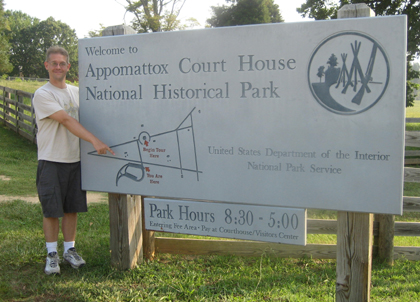
Starting out our day in Appomattox
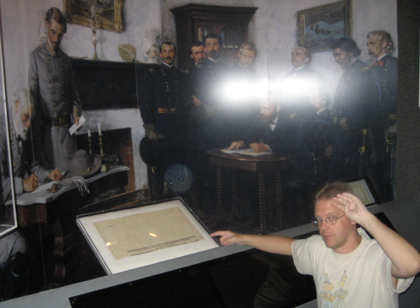
In the Appomattox Court House Museum was the first flag of truce sent in on the day that General Lee surrendered
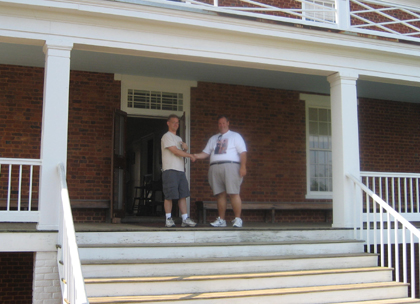
A truce on the McLean steps. I agree not to tease Bob about his missing moustache.
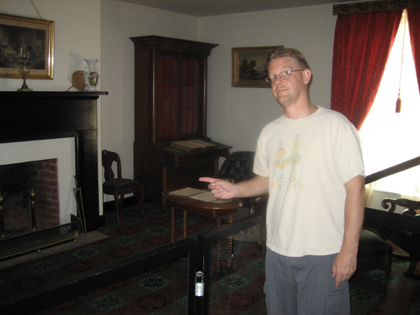
A reproduction of the room where the truce ending the Civil War was signed
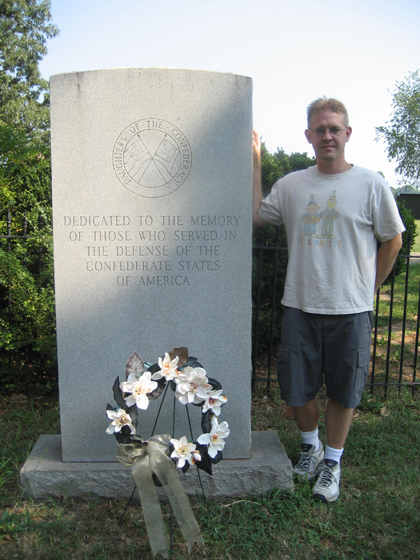
In the Appomattox Court House Confederate Cemetery
From Appomattox, Bob and I then headed west about 25 miles to Lynchburg to see Thomas Jefferson’s Poplar Forest home. The details of this location can be seen here.
Next we travelled north to Lexington where we would spend the bulk of the day. We had already seen the burial site of Stonewall Jackson’s arm and the Stonewall Jackson shrine where he passed away – now we were poised to see the Stonewall Jackson home where he lived prior to the Civil War, followed by the original Stonewall Jackson burial site nearby and the spot where he had been relocated under the Stonewall Jackson memorial statue. I like to think of our trip as the Virginia tour…or even the Presidential tour…but if you were to call it the Stonewall Jackson tour, you wouldn’t be too far off base.
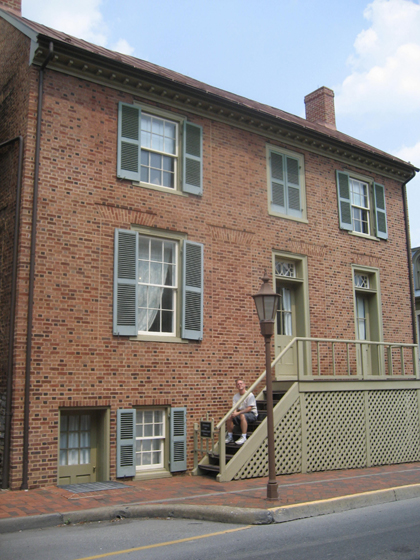
On the stoop in front of Stonewall Jackson’s home
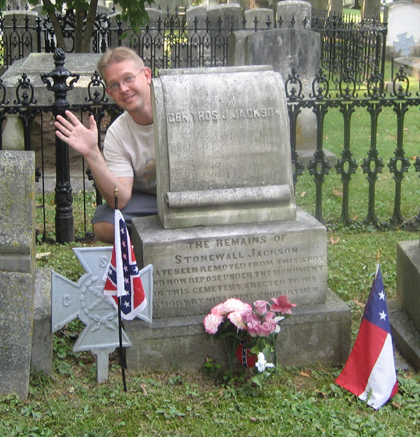
The first site where Stonewall Jackson was buried
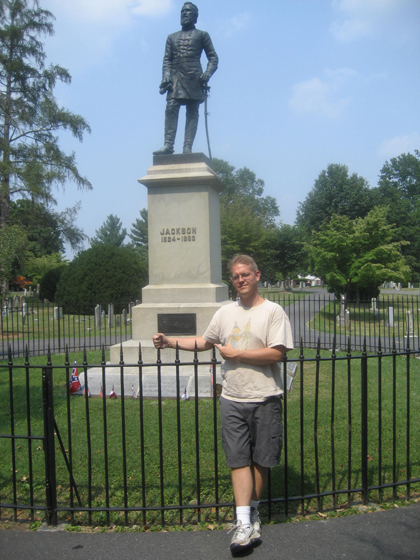
Jackson’s current resting place
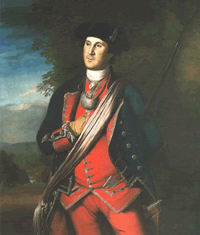 We then spent quite a bit a time at the campus of Washington & Lee University. Here we saw the church in which Robert E. Lee was buried. It would stand to reason that Lee was actually buried in the above-ground sarcophagus statue as seen below, but he and some his ancestors (William Henry Lee and Light-Horse Harry Lee) were actually bured in the crypt vaults below – which were currently closed to public visitation, much to Bob’s dismay. Photos of the church were not permitted with the exception of the monument in the Lee Chapel. So although we saw the original painting of George Washington as seen above right – which was going to be shipped back to the National Archives in short order, I could not get a photo of it. Outside the church was buried Lee’s horse Traveller.
We then spent quite a bit a time at the campus of Washington & Lee University. Here we saw the church in which Robert E. Lee was buried. It would stand to reason that Lee was actually buried in the above-ground sarcophagus statue as seen below, but he and some his ancestors (William Henry Lee and Light-Horse Harry Lee) were actually bured in the crypt vaults below – which were currently closed to public visitation, much to Bob’s dismay. Photos of the church were not permitted with the exception of the monument in the Lee Chapel. So although we saw the original painting of George Washington as seen above right – which was going to be shipped back to the National Archives in short order, I could not get a photo of it. Outside the church was buried Lee’s horse Traveller.

Historical landmark at Washington and Lee
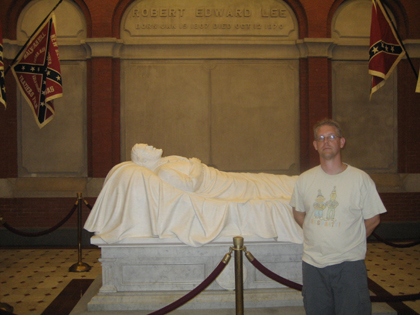
The Robert E. Lee psuedo-sarcophagus

The only member of the Lee family whose grave marker we could actually see
The highlight of the day was the George C. Marshall Museum and Library (where I posed in the jeep at the top of this posting), located on the nearby Virginia Military Institute campus. I didn’t know much about George Marshall going in, but quickly learned how much of a hero he was during World War II, as well as an emissary of peace and owner of the Marshall Plan during the European reconstruction. We not only got to see Marshall’s Nobel Peace Prize, but also the Academy Award presented to Frank McCarthy, VMI amumni and producer of the 1970 Oscar-winning film Patton – along with a great display of videos, displays, and artifacts from the life of Marshall.

Historic landmark sign for VMI
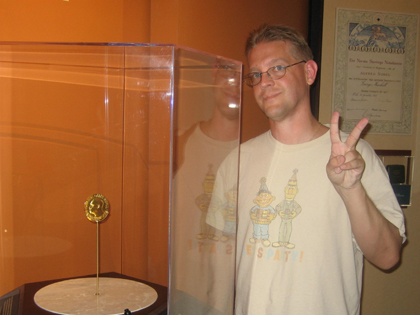
Me and Marshall’s Nobel Peace Prize
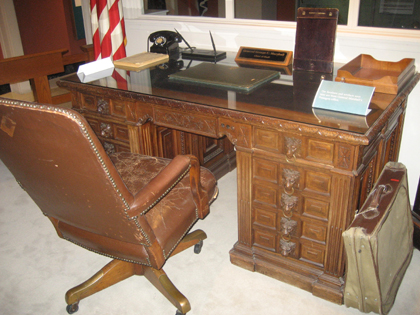
George Marshall’s desk from his Pentagon office

Me and the Patton Oscar
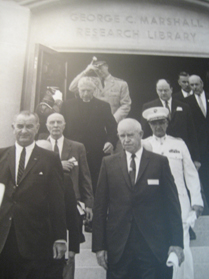
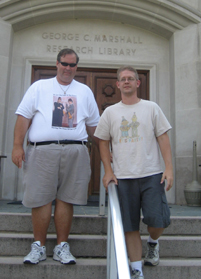
A photo of former Presidents Lyndon Johnson and Dwight D. Eisenhower (barely visible behind him) along with Omar Bradley leaving the Marshall library. At right former Grand Sheiks Satterfield and Bradley in roughly the same spot.
In all, I’d have to say that the Marshall Museum was almost as entertaining as most of the Presidential libraries. And we received a free DVD about Marshall to boot. I also browsed the gift shop and got a couple of very cheap ($1.00) Presidential paperbacks along with my magnet.
Before leaving Lexington, we stopped at the Southern Inn where a reuben and chips really hit the spot. We went ahead and traveled on to Staunton where we would hit the Woodrow Wilson Library and Museum the next morning. There we attempted to stay at a Days Inn in which they hadn’t run the air-conditioning on the second floor all day long. It was a virtual inferno. Bob told the desk clerk that the place would have to cool off to catch on fire. We left and settled on the nearby Knights Inn. The intense heat we were experiencing made my only opportunity this week to jump in the pool all the more refreshing.
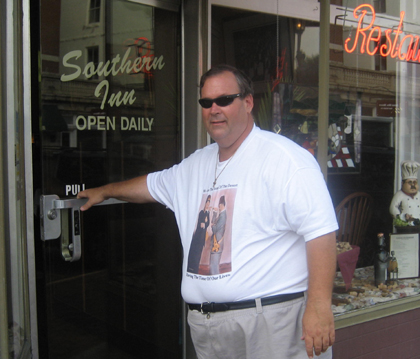
Bob entering the Southern Inn
We had a huge day planned for Thursday, but quickly realized that we would have to slow the pace for the rest of the week if we were going to get in everything we most needed to see.
Leave a Reply